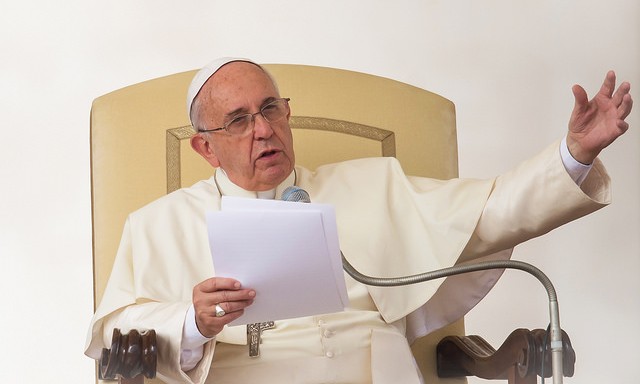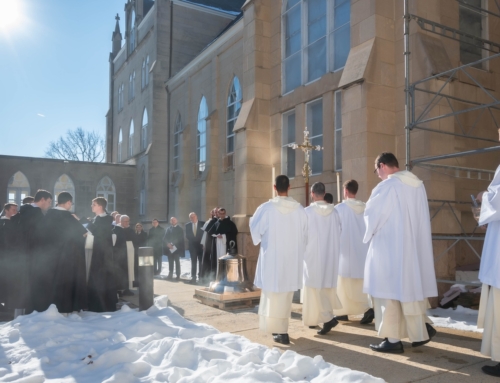Editor’s note: This is the fifth and final post in a series on Pope Francis’ encyclical, Laudato Si’, in honor of the Holy Father’s first visit to the United States.
He has the keys to the papal apartment, but lives in a humble guest house. He dutifully shakes hands with dignitaries, but embraces the disfigured. He has devoted drivers and assistants, but prefers public transportation and picking up his own eyeglasses (he reuses the frames). Such simple gestures have hinted at something of a revolutionary in Pope Francis. He is not afraid to shake things up, to defy expectations, to startle, unsettle, and to challenge. His words and actions have garnered the world’s attention. When does the revolution begin? Where will it take us?
The major outlines have already been given to us. Evangelii Gaudium set the stage, issuing a radical call to conversion and reform within the Church. And with the stage set, Laudato Si’ turns to bring the revolution to the world.
As with other revolutionary manifestos, Laudato Si’ begins with a cry of discontent—the cry of creation and the cry of the poor. Our natural environment is in a perilous condition, our urban environments are dehumanizing, and the poor are the first to suffer from both degradations. A crisis is upon us, and Pope Francis lends his voice to the cries of alarm.
It’s not only the note of crisis that makes the encyclical revolutionary. Many have been warning about the perilous condition of our planet, dehumanizing urban landscapes, and the dreadful plight of the poor, without calling for revolution. No, what’s different with Pope Francis is where he lays the blame.
For Francis the source of our woes is what he calls the “technocratic paradigm.” The problem is power without a purpose. In short, we are killing creation because we’ve forgotten what creation is for. Through technological advances we become more and more powerful, nature becomes more and more subject to our will, and yet our goals and purposes remain vague and uncertain. “Postmodern humanity has not yet achieved a new self-awareness capable of offering guidance and direction. . . . We have too many means and only a few insubstantial ends” (§203). We don’t remember why we’re here, so we’ll settle for more freedom, more money, and more technological marvels—a few insubstantial ends.
But our predicament is worse than mere forgetfulness. Something forgotten can be called to mind by a simple reminder. We’ve forgotten what the world is for because we don’t want to remember. Or better yet, we think it is something best considered in private—something that doesn’t admit of public answers or a global consensus.
Western liberal democracy was born of the quest to disentangle politics from questions concerning man’s ultimate destiny. And by its own measure of progress, the experiment has worked marvelously. So well that many concur with Francis Fukuyama’s famous prognostication that we are approaching “the end of history:” all roads lead to secular liberal democracy. All other social forms and ideologies are passing away. The best hope for peace among peoples is that ultimate questions of God and man and creation’s destiny be kept neutralized in the sphere of private, individual lives and that our common goals be limited to making money, expanding our freedoms, and delighting in technological progress.
For Fukuyama, as peaceable as it may be, the inevitable triumph of secular liberalism—the end of history—is tinged with melancholy:
“The worldwide ideological struggle that called forth daring, courage, imagination, and idealism, will be replaced by economic calculation, the endless solving of technical problems, environmental concerns, and the satisfaction of sophisticated consumer demands. . . . I can feel in myself, and see in others around me, a powerful nostalgia for the time when history existed.”
Fukuyama’s social analysis accords with that of Pope Francis in large measure, but the Pope offers an important corrective. Writing his influential essay in 1989, Fukuyama saw humanity’s existential struggles to be coming to an end, and so he listed concern for the environment as just one of many banal concerns that linger on once man’s ideological struggles have come to an end. For Fukuyama, the triumph of secular liberalism ends with a whimper: banality and nostalgia.
Writing twenty-six years later, Pope Francis sees that the very banalities of secular liberalism which Fukuyama observed have led us to the brink of environmental disaster. Ultimate questions concerning God and man and creation’s destiny are denied any public relevance, leaving only freedom, technological progress, and material prosperity as the matter of public consensus. Power is ordered to no greater end, and as a result, commercial exploitation wreaks havoc upon the world. Pope Francis saw what Fukuyama failed to see: the end of history does not end in a whimper; it ends in environmental destruction. Forget nostalgia—we need a revolution.
What then is the revolution called for by Pope Francis? As I read it, this is how the Laudato Si’ revolution begins: All who share this common home, all who wield economic and political power, everyone on this earth, must publically recognize that we are created. We do not have absolute dominion over creation. Creation, ourselves included, belongs to God. “The best way to restore men and women to their rightful place, putting an end to their claim to absolute dominion over the earth, is to speak once more of the figure of a Father who creates and who alone owns the world” (§75).
This is a revolution that strikes at the heart of the secularity of our postmodern liberal consensus. The public, political, and international acknowledgment of our Creator is our best hope of overcoming the urgent crises of our time. It begins, as do many revolutions, with the breaking of a taboo, the public and political utterance of a private conviction: God alone owns the world. It grows as creation is contemplated while cultivated, as human solidarity rediscovers its true roots, and as profit, freedom, and technology are subordinated to the common good.
Whether or not the world will respond to Pope Francis’s urgent plea, a revolution still looms on the horizon. It is a revolution promised by the Creator himself. History will come to an end. Christ will make all things new, and “each creature, resplendently transfigured, will take its rightful place” (§243). On that day, may we be counted among the revolutionaries—the brave men and women who acknowledged their Creator—so that, at the true end of history, we may find our rightful place with Him forever.
✠







